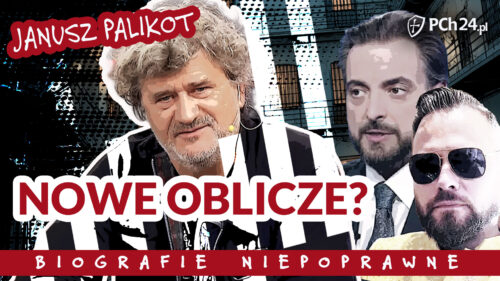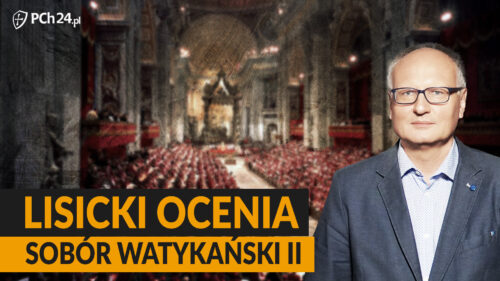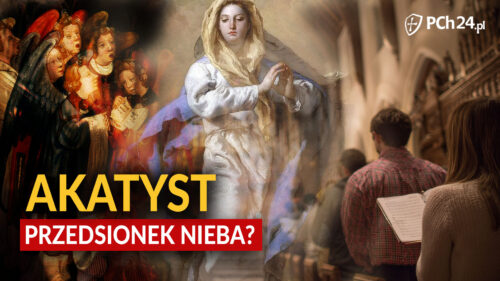“Just being good” ideology is one of the most dangerous. This leads us to consider everything as “good”, falsifying in this way even all that is truly part of the life of man. Jesus did not say to the adulteress, “Well, go and continue to do what you are doing since I forgive you. No! Because she threw herself at his feet and begs forgiveness, he says: “Go and sin no more”. Only if we understand this can we fully enjoy the fruits that the Jubilee of Mercy, offers us – says Prefect of the Congregation for Divine Worship cardinal Robert Sarah.
Wesprzyj nas już teraz!
It is a great honour for me to be allowed to carry out this interview with Your Eminence, especially in view of the recent release of the Polish edition of His beautiful interview book entitled “God or Nothing. A Conversation on Faith”. While expressing my great joy about the fact that this book has been made available to Polish readers, I would like to start from asking about its above, very captivating title. Is it to be understood merely as a summarizing of Your Eminence’s own life and service to the Church or rather as a reminder and a message to all people of good will?
It’s mainly a summary of my own life because my book begins from my experience. I try to explain it in the first pages: I wanted a life dedicated to the contemplation of the Mystery and the following of Christ. I only wanted to pray. But the Lord had other plans for me and He wanted all this. We are useless servants; we are the brushes in the hands of a great Artist: for this reason, it was easy for me to say “yes” to God’s many calls. They are so many calls, which are all privileges that were granted to me: I became a priest, I was able to continue to study and deepen the Bible, I was chosen to become bishop and successor of the Apostles, and finally St. John Paul II asked me to go to Rome to serve His Holiness, who is the Successor of St. Peter. However, life without God is a life that loses its meaning for everyone, not just for me, not so much, though, for people of good will as you mentioned in your question, but for anyone who is called a Christian. If we are baptized, if we recognize ourselves as children of God and followers of Christ, then either God is everything for us and for our lives or our lives will be in vain, in search for continuous satisfaction of our “ego”. The challenge, especially for our world of today, which has not so much killed God but has relegated him to indifference, is to put God at the center. Both Benedict XVI and Francis have reminded us of this: from indifference towards God comes indifference towards others. In fact, if we do not recognize ourselves a children of the same Father, how are we going to recognize each other as brothers?
From the first pages of Your Eminence’s book, it is evident that He has always gratefully perceived the Catholic faith as a privilege, a great gift from God, and, last but not least, as a commitment. It were the European priests, e.g. the Holy Ghost Fathers, who brought the light of Faith to Africa, and also to Your Eminence’s home village, Ourous. However, in the book we also find Your Eminence’s sad ascertainment that Europe, or the Western world, has ceased living up to the principles of Faith it had so fruitfully and effectively preached. Why are so many Western Catholics today unwilling to lead a saintly life, why do they sometimes deliberately refuse trying to be holy? Why do they reject their precious, multigenerational heritage of faith with such ease, without any regret?
Mainly for two reasons. The first is that holiness is considered as prerogative of a few, of some who are perfect. When Jesus called the first apostle, Peter, who was the one who betrayed him at the danger of death… he was anything but perfect. Saint John Paull II throughout his papacy has tried to make us understand that holiness is to be found in daily life for everyone: as long as we want it and as long as we are committed to truly follow Christ. In essence, holiness is not a call for those who change the world or make it better. Holiness is a call for those who love God and who allow God to enter into their hearts and live charity that is, God’s love, every day of their life. The second reason, on the contrary, is the consideration that drives the secularized world to consider holiness as a superstition. Excluding God from our life pushes us to exclude any possibility that God saves us from our sins. At the root, there is always the claim of doing it alone, of being self-sufficient and also what positivism and science have taught us. And this even leads to the belief of being able to create life from itself through technology. Blessed Paul VI has already affirmed this in “Populorum Progressio” that “there is no true humanism but that which is open to the Absolute and in recognizing a vocation that offers the true idea of human life”.
We can currently observe the spreading of “the heresy of good-man-ism”. There are so many people today saying: “It does not really matter what I do, as long as I am a good man”. What is such attitude symptomatic of? Is it not the first step towards claiming one’s own sinlessness, as emptying confessionals seem to suggest? If we do not recognize our need to repent, can we truly benefit from the fruits of the Jubilee of Mercy called by the Holy Father?
Unfortunately, what you say is part of a contemporary ideology that is among the most dangerous – that is, “just being good”. This presupposes that any truthful content is trampled and refuted. This leads us to consider everything as “good”, falsifying in this way even all that is truly part of the life of man. An important contemporary philosopher, Fabrice Hadjadj, has coined a brilliant formula, speaking on the “heresies of charity” of modern man, who confuses charity with the simple desire for good (at best) or almsgiving (in the worst case). But charity is the love of God: therefore, “we are” charity, and we give witness of charity towards others because God loved us first. In the same way, it is also with mercy, superficially understood by many as a clean slate over their sins. But, there is no forgiveness if there is no repentance. Jesus did not say to the adulteress, “Well, go and continue to do what you are doing since I forgive you. No! Because she threw herself at his feet and begs forgiveness, he says: “Go and sin on more”. Only if we understand this can we fully enjoy the fruits that the Jubilee of Mercy, offers us. The Holy Father has said many times: it is true that Jesus always goes before us and waits for us with open arms. But it is up to us to also move towards Him! Jesus died on the cross, with arms outstretched towards all: He died begging the Father’s forgiveness for us. Who can do this but only God Himself? How can we not recognize him?
A year ago, Your Eminence has been appointed by His Holiness Pope Francis Prefect of the Congregation for Divine Worship and Discipline of Sacraments. As the Vatican’s chief guardian of liturgy, could Your Eminence offer us some comments about His observations with regard to the present interdependence between lex orandi and lex credendi? Seeing that the Church believes as she prays, what are the main deficiencies in the way we pray nowadays and how do these deficiencies affect our belief?
The first thing is to recognize that there is no faith without prayer. Faith is not spiritualism or sentimentalism. Faith is a journey that begins with an encounter, the personal encounter with God as Benedict XVI has very well said in “Deus Caritas Est”. Also, faith is not a matter that is acquired once and for all, but it is a relationship that is fed. How can we feed it if not with prayer, which is a dialogue with God? I have a question: when you love a person, I am thinking, for example, of two betroths or husband and wife, what you want is to spend more quality time with that person. You want to live with that person for the rest of your life. Now, if we say that we love God, how can we think of being without Him and without talking to Him? Therefore, faith is nourished by works. As I said, God has first loved us, made us his children and only by virtue of this can we love our neighbor as a brother. This is love; God’s love to which we are called to live each day with one another.
Pope Benedict XVI called Africa the continent of hope, “the spiritual lung of humanity”. In the book “Christ’s New Homeland – Africa”, comprising contributions of African Bishops to the Synod on the Family, Your Eminence referred to the habit of African people to speak loud or even to shout so as to scare off wild beasts. Is there a hope that, in these times of growing confusion surrounding any possible changes of pastoral practices regarding family and marriage, the African Catholics will stand up and speak to protect wounded families from those who could harm them even more? Can such positive contribution of Africa be expected also in other areas of the life of the universal Church?
Every Catholic must give all of himself for the universal Church. The Church is “Mater et Magistra”; she is the Bride of Christ. Therefore, if we are part of this matrimony, how can we hold back and not carry out our responsibility as spouses? Speaking of the African Church, I believe that it can give so much. Africa, from the beginning, is part of God’s plan. Just look at Revelation. When God chose to establish a covenant with man, he began in Egypt. It was Africa that saved Jesus: Mary and Joseph fled into Egypt to escape Herod’s edict against all male born, and therefore, against Jesus Himself. And, again, it was an African, Simon of Cyrene, who help Jesus carry his cross to Calvary. So, from the beginning, God wanted to involve Africa in the plan of salvation for the world. Then, the attention that the Popes have had for this continent has a long standing. In 1969, Pope Paul VI said that “Africa is the new homeland of Christ”. The numbers bear witness to how Africa is open to God: in a century, Christians have gone up from 2 million to 200 million. John Paul II said that “the name of each African is written on the crucified palms of Christ” (EIA n. 143). In other words, it means that Africa, with her weakness and poverty, is the instrument through which God manifests his power. Benedict XVI called Africa the spiritual lung of humanity. This is the humble contribution of Africa to the universal Church: the martyrs of the first centuries and those of today, their fidelity to Christ, to His Gospel and to the steadfast attachment to the Church’s teaching. And in the wake of this mutual love, Pope Francis has been in Central Africa, opening there, even before Rome, the Holy Door for the Jubilee Year. It was an extraordinary gesture.
Venerable Fulton J. Sheen used to say: “It does not require much time to make us saints; it requires only much love”. According to Your Eminence, where to start from if one would like to attempt holiness?
The starting point is only the love of God. There is no other solution. We can love our neighbor as God has loved us, just because God has loved us first. So, when we speak of love, we are not referring to an abstract and passing sentimentalism, but of a lasting and eternal love. Love is a term so abused and disfigured in contemporary society that we should all have at least a little bit of discretion in pronouncing the word. Today we are confronted with a type of compassionate technicality, according to which in the name of love we come to the point of killing each other – through euthanasia or abortion – so as to free the other from his suffering! Do you realize what an abominable point we are approaching? We use the words love, sentiment, affection – to justify what is an act of death! Instead, as Benedict XVI wrote in the Encyclical „Deus Caritas Est”: “Love is “divine” because it comes from God and unites us to God; through this unifying process it makes us a “we” which transcends our divisions and makes us one, until in the end God is “all in all” (1 Cor 15:28)”. But love of God and love of neighbor are inseparable: the Church herself is the fruit of a love story. Love is demanding! To truly love is to love even unto death – even death on a cross. Modern man is discouraged by the journey that awaits him because he does not understand the reason why he lives: he needs high goals, yearns for high goals because his goal is holiness. A mountaineer aims for the peak of the mountain because he knows that there he will find peace and refreshment whereas, if he were to listen to the voices of those who discourage him, he would fall into the rift. The fact is that nowadays it seems easier not to commit to greater vocations: we live in a pulverized society, in a culture where personal desires become rights. Man must understand that holiness is a path to follow every day, offering to God the value of the things that we do: in the family, at work, in social and community life. This is what the great saints of the Church teach us. And nothing could be more beautiful.
Izabella Parowicz
Click here to read the interview in polish
Chcesz przeczytać ten wywiad po polsku? Kliknij tutaj













